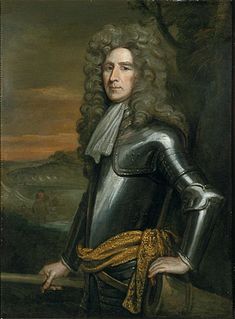
The 1680s decade ran from January 1, 1680, to December 31, 1689.

1683 (MDCLXXXIII) was a common year starting on Friday of the Gregorian calendar and a common year starting on Monday of the Julian calendar, the 1683rd year of the Common Era (CE) and Anno Domini (AD) designations, the 683rd year of the 2nd millennium, the 83rd year of the 17th century, and the 4th year of the 1680s decade. As of the start of 1683, the Gregorian calendar was 10 days ahead of the Julian calendar, which remained in localized use until 1923.

James Scott, 1st Duke of Monmouth, 1st Duke of Buccleuch, KG, PC was a Dutch-born English nobleman and military officer. Originally called James Crofts or James Fitzroy, he was born in Rotterdam in the Netherlands, the eldest illegitimate son of Charles II of England, Scotland, and Ireland with his mistress Lucy Walter.

Arthur Capell, 1st Earl of Essex, PC, also spelled Capel, of Cassiobury House, Watford, Hertfordshire, was an English statesman.

The Rye House Plot of 1683 was a plan to assassinate King Charles II of England and his brother James, Duke of York. The royal party went from Westminster to Newmarket to see horse races and were expected to make the return journey on 1 April 1683, but because there was a major fire in Newmarket on 22 March, the races were cancelled, and the King and the Duke returned to London early. As a result, the planned attack never took place.

Admiral of the Fleet Edward Russell, 1st Earl of Orford, PC was a Royal Navy officer and politician. After serving as a junior officer at the Battle of Solebay during the Third Anglo-Dutch War, he served as a captain in the Mediterranean in operations against the Barbary pirates.

John Ketch, generally known as Jack Ketch, was an infamous English executioner employed by King Charles II. He became famous through the way he performed his duties during the tumults of the 1680s, when he was often mentioned in broadsheet accounts that circulated throughout the Kingdom of England. He is thought to have been appointed in 1663. He executed the death sentences against William Russell, Lord Russell, in Lincoln's Inn Fields on 21 July 1683, and James Scott, 1st Duke of Monmouth, on 15 July 1685, after the Monmouth Rebellion. Ketch's notoriety stems from "barbarity at the execution of Lord Russell, the Duke of Monmouth, and other political offenders".

Henry Sidney, 1st Earl of Romney was an English Whig politician, soldier and administrator. He is now best remembered as one of the Immortal Seven who drafted the Invitation to William of Orange, which led to the November 1688 Glorious Revolution and subsequent deposition of James II of England.

William Russell, Lord Russell was an English politician. He was a leading member of the Country Party, forerunners of the Whigs, who during the reign of King Charles II, laid the groundwork for opposition in the House of Commons to the accession of an openly Catholic king in Charles's brother James. This ultimately resulted in Russell's execution for treason, almost two years before Charles died and James acceded to the throne.

William Russell, 1st Duke of Bedford KG PC was an English nobleman and politician who sat in the House of Commons from 1640 until 1641 when he inherited his Peerage as 5th Earl of Bedford and removed to the House of Lords. He fought in the Parliamentarian army and later defected to the Royalists during the English Civil War.
Events from the year 1686 in England.
Events from the year 1685 in England. This year sees a change of monarch.
Events from the 1550s in England. This decade marks the beginning of the Elizabethan era.
Events from the 1620s in England. This decade sees a change of monarch.
Events from the year 1631 in England.

Rachel, Lady Russell was an English noblewoman, heiress, and author. Her second husband was William, Lord Russell, who was implicated in the Rye House Plot and later executed. A collection of the many letters she wrote to her husband and other distinguished men was published in 1773.
Col. Thomas Walcot born in Warwickshire, the fourth son of Charles Walcot and Elizabeth Games, was a Puritan and Lt. Col. in the Parliamentary Army. Thomas married Jane Blayney, purchased Ballyvarra Castle in 1655, and in 1659 was at Dunmurry. He settled at Croagh, Co. Limerick, Ireland where he had an estate of £800 per annum. He also had lands at Amogan in the Barony of Lower Conneloe. He was offered the Governorship of Province of Carolina, but declined it. Arrested in 1672 on allegation of planning a Dutch invasion of Ireland. Spent eight months in Tower of London before being exonerated.
Events from the year 1683 in the Kingdom of Scotland.
Events from the year 1684 in the Kingdom of Scotland.











